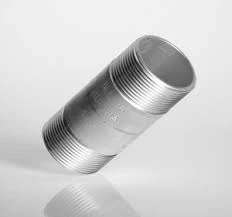-
Cangzhou Yulong Steel Co., Ltd.
-
Phone:
+86 13303177267 -
Email:
admin@ylsteelfittings.com
- English
- Arabic
- Italian
- Spanish
- Portuguese
- German
- kazakh
- Persian
- Greek
- French
- Russian
- Polish
- Thai
- Indonesian
- Vietnamese
- Zulu
- Korean
- Uzbek
- Hindi
- Serbian
- Malay
- Ukrainian
- Gujarati
- Haitian Creole
- hausa
- hawaiian
- Hebrew
- Miao
- Hungarian
- Icelandic
- igbo
- irish
- Japanese
- Javanese
- Kannada
- Khmer
- Rwandese
- Afrikaans
- Albanian
- Amharic
- Armenian
- Azerbaijani
- Basque
- Belarusian
- Bengali
- Bosnian
- Bulgarian
- Catalan
- Cebuano
- China
- China (Taiwan)
- Corsican
- Croatian
- Czech
- Danish
- Esperanto
- Estonian
- Finnish
- Frisian
- Galician
- Georgian
- Kurdish
- Kyrgyz
- Lao
- Latin
- Latvian
- Lithuanian
- Luxembourgish
- Macedonian
- Malgashi
- Malayalam
- Maltese
- Maori
- Marathi
- Mongolian
- Myanmar
- Nepali
- Norwegian
- Norwegian
- Occitan
- Pashto
- Dutch
- Punjabi
- Romanian
- Samoan
- Scottish Gaelic
- Sesotho
- Shona
- Sindhi
- Sinhala
- Slovak
- Slovenian
- Somali
- Sundanese
- Swahili
- Swedish
- Tagalog
- Tajik
- Tamil
- Tatar
- Telugu
- Turkish
- Turkmen
- Urdu
- Uighur
- Welsh
- Bantu
- Yiddish
- Yoruba

Oct . 09, 2024 05:28 Back to list
Generating an alternative title for API 5L PSL1 Pipe Specifications and Features
Understanding API 5L PSL1 Pipes Specifications and Applications
API 5L PSL1 pipes are essential components in the pipeline industry, designed for the transportation of oil, gas, and other fluids. The term API stands for the American Petroleum Institute, which sets standards for the oil and natural gas industry. The API 5L specification outlines the requirements for the manufacturing and testing of line pipes, ensuring safety and reliability in pipeline infrastructure.
The API 5L specification is divided into two product specification levels PSL1 and PSL2. While both levels meet the basic requirements for pipe manufacturing, PSL1 is considered the standard tier, focusing on basic quality requirements without the stringent testing protocols found in PSL2.
Key Features of API 5L PSL1 Pipes
1. Material Composition API 5L PSL1 pipes are typically made from carbon steel, with various grades defined by their yield strength and tensile strength capabilities. Common grades include X42, X46, X52, X56, and X60. Each grade corresponds to different mechanical properties, with higher grades capable of withstanding more significant pressures and stresses.
2. Manufacturing Process The pipes can be produced using various methods, including seamless and welded construction. Seamless pipes are made from solid round billets, which are heated and extruded into the desired shape. On the other hand, welded pipes are formed by rolling a strip of metal and welding the edges together. Seamless pipes generally offer better mechanical properties and are preferred in high-pressure applications.
3. Dimensional Standards API 5L PSL1 pipes are manufactured in specific diameters, wall thicknesses, and lengths. The standard dimensions facilitate the interoperability of piping systems, ensuring that various components can be easily connected across different projects.
api 5l psl1 pipe

4. Testing and Quality Control While PSL1 pipes do not require the extensive non-destructive testing mandated by PSL2, they must still undergo basic quality checks, including visual inspections and mechanical property assessments. This ensures that the pipes meet minimum performance criteria before being used in installations.
Applications of API 5L PSL1 Pipes
API 5L PSL1 pipes are widely used across the globe in various applications. Their primary use is in the transportation of oil and natural gas from extraction points to processing plants and distribution centers. Additionally, they are employed in water supply systems, industrial processes, and infrastructure projects where reliable fluid transport is essential.
The versatility and reliability of API 5L PSL1 pipes make them an attractive choice for many engineering projects. As global energy demands rise, the need for durable and efficient pipelines continues to grow, ensuring that API 5L standards will remain vital in the industry.
Conclusion
API 5L PSL1 pipes play a crucial role in the energy sector and other industries reliant on fluid transportation. Understanding their specifications, manufacturing processes, and applications highlights the importance of these pipes in maintaining efficient and safe pipeline networks. As technology advances and industry standards evolve, the significance of API 5L PSL1 pipes will continue to be a foundational aspect of pipeline engineering.
Latest news
-
ANSI 150P SS304 SO FLANGE
NewsFeb.14,2025
-
ASTM A333GR6 STEEL PIPE
NewsJan.20,2025
-
ANSI B16.5 WELDING NECK FLANGE
NewsJan.15,2026
-
ANSI B16.5 SLIP-ON FLANGE
NewsApr.19,2024
-
SABS 1123 FLANGE
NewsJan.15,2025
-
DIN86044 PLATE FLANGE
NewsApr.19,2024
-
DIN2527 BLIND FLANGE
NewsApr.12,2024
-
JIS B2311 Butt-Welding Fittings LR/SR 45°/90° /180°Seamless/Weld
NewsApr.23,2024











